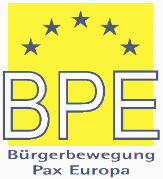Below is the intervention read by Elisabeth Sabaditsch-Wolff, representing Bürgerbewegung Pax Europa at the OSCE Human Dimension Implementation Meeting, Session 13 “Combating Hate Crimes and Ensuring Effective Protection and against Discrimination”, Warsaw, September 29, 2015.

Intervention by Bürgerbewegung Pax Europa
OSCE Human Dimension Implementation Meeting
Working Session 13
Specifically Selected Topic: Combating Hate Crimes and Ensuring Effective Protection and against Discrimination
The Tyranny of Bad Definitions
When working with topics as basic as fundamental freedoms, freedoms currently under attack using the concept of “hate crime”, it should be self-evident that one needs to apply very high standards of precision, caution and democratic principles. Failing that, the powerful tools of international law and human rights instruments can potentially fall prey to hostile intent and misuse.
Overly broad or purposefully vague definitions lend themselves to misuse by enemies of free, secular societies, as has historically been the case previously in non-democratic societies. Possibly the best-known example of this is the term “Enemy of the working class”, used by the Soviet Union to discredit, stigmatize and persecute the critics of a fundamentally broken system. As long as the Soviet system had moral authority, this strategy worked. When the system was exposed, it failed.
This strategy was successful until the system lost moral authority and was exposed.
In order to promote the genuine rule of law, democracy and freedom, the tools of international law require clear definitions and clear limits to the power that authorities hold over non-criminal citizens. In case of doubt, it is best to err on the side of caution — that is, on the side of less control, restriction and punishment, and in particular to uphold the principle of innocent until proven guilty.
Unclear definitions can be misused by governments and other institution of power to repress, marginalize and stigmatize inconvenient persons, their opinions, or even the topics they intend to discuss. Good laws and guidelines protect against such attacks on freedom of expression and media. Bad (usually overly broad) laws will be used by enemies of freedom to further their goals.
We need to be able to recognize and counter such problems and strategies today, as we were able to previously.
Ladies and gentlemen, seeking to control the details of how citizens may or may not act or express themselves cannot constitute the Rule of Law, cannot constitute freedom. It is our old enemy: Tyranny.
Bürgerbewegung Pax Europa therefore recommends:
- That definitions of terms used in OSCE documents always be provided, possibly by reference.
- That terms with overly broad or unclear definitions should not be used in OSCE documents, also in order to secure that well-meaning decisions cannot be exploited by enemies of free societies.
- That care be taken to not incite a mob mentality through the use of poorly defined terms.
- That the Rule of Law principle of “innocent until proven guilty” be kept in mind and applied.
For links to previous articles about the Organization for Security and Cooperation in Europe, see the OSCE Archives.

Is anyone listening to these statements other than the people in the room, most of whom don’t even want to hear it…
It would be interesting to me to read the opinions expressed by those that do not agree with our team. And BTW, I say thank you, thank you, thank you to “OUR TEAM.”
This statement should be sent to the British government and someone should stand over them while they read it and test them afterwards on its content.
Much good may it do.